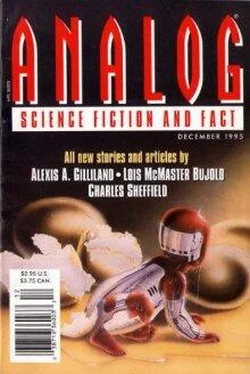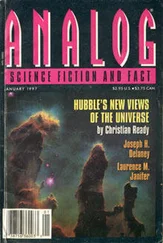Alexis Gilliland - The Third Wave
Здесь есть возможность читать онлайн «Alexis Gilliland - The Third Wave» весь текст электронной книги совершенно бесплатно (целиком полную версию без сокращений). В некоторых случаях можно слушать аудио, скачать через торрент в формате fb2 и присутствует краткое содержание. Год выпуска: 1995, Издательство: Dell Magazines, Жанр: Фантастика и фэнтези, на английском языке. Описание произведения, (предисловие) а так же отзывы посетителей доступны на портале библиотеки ЛибКат.
- Название:The Third Wave
- Автор:
- Издательство:Dell Magazines
- Жанр:
- Год:1995
- ISBN:нет данных
- Рейтинг книги:5 / 5. Голосов: 1
-
Избранное:Добавить в избранное
- Отзывы:
-
Ваша оценка:
- 100
- 1
- 2
- 3
- 4
- 5
The Third Wave: краткое содержание, описание и аннотация
Предлагаем к чтению аннотацию, описание, краткое содержание или предисловие (зависит от того, что написал сам автор книги «The Third Wave»). Если вы не нашли необходимую информацию о книге — напишите в комментариях, мы постараемся отыскать её.
The Third Wave — читать онлайн бесплатно полную книгу (весь текст) целиком
Ниже представлен текст книги, разбитый по страницам. Система сохранения места последней прочитанной страницы, позволяет с удобством читать онлайн бесплатно книгу «The Third Wave», без необходимости каждый раз заново искать на чём Вы остановились. Поставьте закладку, и сможете в любой момент перейти на страницу, на которой закончили чтение.
Интервал:
Закладка:
“That would work. Maybe that’s the way we ought to do it on the next one,” suggested Winslow.
“What next one?”
“Complex Six, Doctor Sioux. We finished the excavation already, and so far the chambers are testing real good as far as leaks are concerned. The power lines are in place, so all we have to do is install the lighting system and start growing stuff.”
A sigh. “We haven’t got enough water. We don’t even have enough water for here.”
“We don’t need water, do we? Everything gets recycled, right?”
“Eventually.” Kerry opened her lunch box. “Look, Winslow, one of the things we’re wanting to do eventually is set us up an orchard. Fruit trees, all right? Apples, oranges, peaches, plums, you name it. Know what the problem is? Our water inventory gets tied up in the wood and isn’t available for recycling.”
Winslow blinked. “Trees aren’t water,” he said. “Trees are wood.”
“Come on, Winslow, wood is mostly cellulose, which is a sugar polymer, and sugar monomer is typically C 6H 12O 6, one molecule of water for every atom of carbon. Cellulose is more than half water, for God’s sake.”
“Well, we just have to requisition some more water then.”
Kerry unscrewed the thermos and poured herself a cup of hot tea. “At $200 a pint for shipping you aren’t going to get much.”
“It’s a lot cheaper growing our own food up here than shipping stuff up from Earth.”
“That’s true.” She took a cautious sip of tea. “What’s really cheaper, though, is to cut staff. That way, you don’t need to schlep up the food or the water.”
Winslow unwrapped an egg salad sandwich. The local food chain recycled human wastes to bacteria, feeding the resulting single-cell protein to the chickens. “You hear rumors,” he conceded. “But they aren’t going to close us down. Are they?”
“Remember the prospectus? The big deal was: We’ll beam cheap power down to Earth and build a city in the sky doing it. You know what happened? Wind farms happened. New and improved photovoltaics happened. Power got cheap. How cheap? Cheaper than we can make it. We’re here because we’re here, but as God is my witness, we sure aren’t going anywhere.”
“How come?” he asked. “I mean, all that we have to do is start building the stuff, power stations or DSMs, whatever. We can do it here, or in lunar orbit, whichever works best.”
“You think cities are all glass and steel, don’t you? Back home, cities were always built where the water was, and what the earliest civilizations were all about was hydraulics; dams, levees, canals, irrigation projects.” She took a bite of her chicken sandwich, and washed it down with a swallow of tea. “Water is something Luna ain’t got, Winslow, and without water, there aren’t going to be any cities.”
“Not on Luna, maybe, but in orbit, at the L-5 point or somewhere.”
She sighed. Winslow wouldn’t admit that a lack of water was more than a temporary problem, soluble by signing a requisition form. “Yeah, sure. Look, what a city needs is a hinterland, someplace to grow the food, right?”
“That’s what we’re doing here,” he agreed. “Edibles engineering.”
“You don’t like farming? The other thing a hinterland does is recycle, reusing the—call it the post-consumer edibles.”
“Well, we recycle now, Doctor Sioux.”
She finished her sandwich. “Yeah, sure. And I can taste the single-cell protein they fed that poor chicken, too. It would be nice to eat a little higher on the food chain, Winslow, but for that you need water.”
“I agree! What do you say we requisition a couple of tons?”
“Hey, as long as you’re wishing, why not a couple of hundred tons?”
CHAPTER 2
The Planting
The gods blessed Turi John Ramos’s press conference with a slow news day coming at the end of a slow news week. He looked out at the reporters who had responded to his early morning call and knew that he was going to get his hearing. They’ll hear what you have to say, he thought, and refuse to believe it, to act on it, so at the very best you’ll be going down in a blaze of glory. He found the thought terrifying, but at the same time oddly comforting; if the world couldn’t be saved it wouldn’t be because he, personally, hadn’t done his best.
Palms moist, mouth dry, he walked up to the podium as punctually as if he was attending his own execution, and began his presentation. He rambled on for twenty minutes explaining the evils of plutonium, the rationale for building the starship, and another ten on the necessity for getting an exemption from the Geneva Convention. Then, as his allotted time in the departmental auditorium was beginning to run out, he came around to the business at hand, the solution he was proposing to the problems he had just outlined.
“The solution, ladies and gentlemen, is to build an Orion Starship, a starship driven by hydrogen bombs.” There was a sudden stir as the reporters pricked up their ears; there was a story here, after all.
“There is, of course, far too much that we don’t know about building an Orion Starship, let alone building one in space, which is where it would have to be done. So what we are proposing to do is take it in small steps. First, set up a yard, or an assembly area in lunar orbit, where we can collect matter shot up from the lunar surface to build ourselves a prototype. It is our belief that the physics of the Orion Starship can be solved rather easily. The initial plans call for a vehicle massing 100,000 tons, driven by a parabolic sail 1,200 meters deep, having a mouth 2,000 meters wide. At the focal point of the parabola, we will explode—in the vacuum of space—a hydrogen bomb, which will give our vessel a kick in the pants—pardon me, an impetus—amounting to a one second pulse of about six g . Two times an hour for eight and a half years.” He turned to the model he had brought with him, a clear plastic hemisphere with a long, skinny stem. “That’s hard traveling, folks. The recoil mechanism will soften it, sort of like this….” He held the stem and pushed the bell up onto it, hoping the drop of oil had stopped the sticking, and smiled with relief as the bell slowly returned to its original position. “We think a thirty or maybe thirty-five minute interval is necessary—one of the things we’re looking to find out for sure—to let the sail cool sufficiently to prevent any heat buildup from the repeated explosions that will drive the ship. At that rate, we sustain an average acceleration of about 0.02 g.
“To learn what we need to know, the prototype needs to stretch its legs, so we will not go to Mars, as has been suggested, but beyond Mars, to the outer asteroid belt. The specific destination our staff has selected is one of the Trojans, Diomedes, diameter 171 kilometers, which is known to have frozen water. At 0.02 g, this trip of 5 astronomical units, a nominal half billion miles, will take about 34 days, burning up 1,600 hydrogen bombs in the process. I have heard it said that all the Moon needs is a little water and a better class of people to be a pretty decent place. Well, ladies and gentlemen, that’s all Texas needs.” There was a laugh. “We plan to have a better class of people on board, and we know that Diomedes has water. It will have to be mined, but once at its destination, that ship of ours can easily take on all the tons of water and soil they want, and spin itself to provide our heroic crew the gravity they need.” He looked around. “Any questions?”
“Will the ship be making a round trip?” asked a woman in a red dress.
“No,” replied Turi John. “Once we reach Diomedes, the crew will practice setting up a working habitat, just as we would expect them to be doing at the end of their generations-long trip.”
Читать дальшеИнтервал:
Закладка:
Похожие книги на «The Third Wave»
Представляем Вашему вниманию похожие книги на «The Third Wave» списком для выбора. Мы отобрали схожую по названию и смыслу литературу в надежде предоставить читателям больше вариантов отыскать новые, интересные, ещё непрочитанные произведения.
Обсуждение, отзывы о книге «The Third Wave» и просто собственные мнения читателей. Оставьте ваши комментарии, напишите, что Вы думаете о произведении, его смысле или главных героях. Укажите что конкретно понравилось, а что нет, и почему Вы так считаете.












